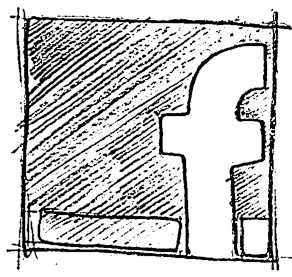by Jesse Klein
‘How can I be like Michael Jackson, I can’t sing or dance!’ Kanye West recently exclaimed in an interview. This comment refers to the rumors that West crowned himself the new King of Pop after Jackson’s death in June 2009. This simply is not true; the publication Scrape (in the same vein as The Onion) created this quote, riffing on Kanye’s large mouth and super-sized ego. However, Kanye has made a number of comments that accomplish the same task, of putting he and Jackson in the same conversation.
He has compared the proliferation of his ‘Kanye Glasses’ to Jackson’s cultural presence. He told The Fader in ’08, ‘It's little pieces of what he had, his level of influence. And it's like that's either the one-off or it's the beginning of a lot of it.’ He references him in his music: ‘Got a light skinned friend, look like Michael Jackson, Got a dark skinned friend, look like Michael Jackson.’ And most recently, in his Thriller-esque experimental short film/music video Runaway, Jackson is the figurehead, literally, of a procession that includes a marching band, a black and red clad Klu Klux Klan gang, and a five-story blow up of Michael’s head circa Dangerous. Yeezy explained to MTV, ‘in relation to the Michael Jackson thing is not the KKK but the concept of cult.’ If you keep putting two words next to each other, over time they start to connect, to share meaning. Reverence becomes more comparison and less homage.
Essentially, Kanye is putting their names in the same sentence and then decrying his horror at having their names put in the same sentence. Self-promoter extraordinaire, he maintains the humility by denying the comparison, then reaps the benefits both ways: as the humble disciple, but one with shrewd eyes on the throne. And either way, it’s great press. Anyone’s name next to Michael Jackson looks good. After the fake story was published, and then reposted on numerous sites, West responded on his blog, ‘IT MAKES ME FEEL BAD THAT OBVIOUSLY I MADE PEOPLE FEEL THAT I WOULD BE CORNY ENOUGH TO SAY SOMETHING SO WHACK AFTER THE PASSING OF AN IDOL, A LEGEND AND MORE THAN THAT A HUMAN BEING WITH FEELINGS AND FAMILY’ (caps his). Other artists mention Jackson -- they can’t not, his legend looms so large in pop culture -- but Kanye does so more deliberately somehow, and cynically. Clearly, whatever Kanye is doing, or not doing, or doing by claiming he’s not doing though we know he’s really doing, is working.
Kanye’s sly allusions are factually inaccurate and morally reprehensible. To say that celebrity is a form of religion is not a new concept. There are faces, personas that are revered, recognized the world over. Marilyn Monroe, Michael Jordan, Madonna (and those are just the M’s) are omnipresent, known to toddlers, to those who have seen the images and heard the names even if they do not know who they are. Michael Jackson has one of the most recognizable names and faces on the planet, ever, and is the most famous entertainer of all time. 99% of people on the planet know who he is, have known for over thirty years. His best selling album, Thriller, has sold 110 million copies, nearly three times ACDC’s Back in Black, a distant second place. For these reasons alone, it is silly of Kanye to back-handedly draw the comparison. Jackson is a pop star come religious icon, if ever there was one. The idolatry that started with Elvis, then The Beatles culminated with Jackson’s celebrity, from his rapturous reception worldwide, including in developing nations, to his all-too-public private life. Sadly, it is this personal life that elevated him to a mythic and ultimately tragic status, and should prohibit offhand references such as Kanye’s.
Not to blaspheme, but on paper, a parallel can be drawn between the life of Michael Jackson and that of Jesus Christ. Both had demanding fathers. Michael’s father Joe Jackson infamously physically and verbally abused him. The issue of Immaculate Conception surrounded both of their lives: in an interview in 1993 with Oprah, at age 35, Jackson refused to admit if he was a virgin or not, because he was a ‘gentleman’. (Imagine another adult celebrity, ever, anywhere, making a similar claim.) He now has three kids and the issue of their conception has widely been debated. Also, there is an aspect of chosen-ness to Jackson’s career; thrust into it far too young by a controlling father, with a talent that he could not deny the world, despite his own personal best interest. But most crucially, both died for our sins.
No celebrity has been more scrutinized, more battered, has suffered for his fame, like Jackson. No celebrity (read: person), ever. From age eight, there was no private life, no ‘life’ in the way the average person understands the term; Jackson’s only existence was a public one, a performative one. And he was too fragile for it. He repeatedly said that he was most comfortable when performing. It was the part of life he knew the best, could do the best. His performative nature and understanding of his place in the world also defined his personal relationships, chiefly his romantic ones. They seemed public, for show. Jackson’s disposition was too delicate, too open to successfully have an adult personal life while being a superstar. He sacrificed himself so that he could give the world his body of work. Other celebrities, like Kanye, relish the attention, revel in it.
Kanye too thrives publicly but his tone is exhibitionistic, narcissistic. Where Michael came across as someone who was sharing a gift, Kanye appears to grab at all the cultural real estate available. Where Michael gave, Kanye takes. He thrives on attention, can’t live without a mirror of millions looking back at him. He performs, gladly, each minute of his waking life. This is why blogging and Twitter are so essential to his over-sharing, overblown, over-everything public persona. Kanye savors any opportunity to be the center of attention, and revolts when he isn’t (the 2006 and 2009 VMAs are textbook examples). He uses Twitter to proselytize his every word, to share his every thought with his fans. This is not unique, but the language he uses and the tone he employs is that of the oracle, of the chosen one. But a chosen-ness, unlike Michael’s, that is self-imposed.
After his recent Today Show interview with Matt Lauer concerning his George Bush comment in the wake of Katrina, Kanye went on one of his now expected Twitter rants which include, though are not limited to, the following comments: ‘I don’t trust anyone but myself! Everyone has an agenda. I don’t do press anymore. I can’t be everything to everybody anymore.’ ‘Maybe Mike could have explained how the media tried to set him up! It’s all a f-ing set up!’ and ‘I can’t be everybody’s hero and villain savior and sinner Christian and anti Christ!’ The first comment is a mere lie; the comment itself is press. The second statement is coyly confessional. He seeks advice from the departed Michael when looking at any aspect of his life is answer enough—it’s merely name-dropping. And the final comment has Kanye’s rapper narcissism shine through, his true colors as self-promoter. The opposite of Anti-Christ isn’t Christian…
Kanye is a self-anointed anointed one. He believes he is shouldering a burden, fame, that ‘everyone will see and understand one day’ (also from Twitter). But, really, he’s just working the game, and expertly so. No one is using the various forms of press better than Kanye. He is everywhere, extending to all the entrepreneurial outlets offered to rap stars, and now he’s directing films. Runaway is ambitious, an orgiastic symphony of every idea, image and feeling he can conjure, has ever conjured. It’s spectacular, but only because it’s laden with spectacle. He’s trying to out-Thriller Jackson, but while Thriller is entertainment at its purest, a landmark of not only music videos but of television, Runaway is pretentious, a series of half-baked thoughts infused with alleged High Seriousness.
It’s a shame, really. With a little less bravado (what would rap be without it?), a little more thoughtfulness, Kanye could be the figure he claims he is. My Beautiful Dark Twisted Family is SO GOOD (caps mine). His artistry and talent—his music—are more than enough. He doesn’t have to be Michael. He’s Kanye.
One of Michael Jackson’s defining traits was his selflessness; of course in his charity work though even his music was about others and otherness. If they were ever about himself, they described how his personal struggles could be applied to his listeners. He always sang from the inside out. Kanye is all outside in. He takes the world, internalizes it, is offended by it, and then sounds off bitterly, noisily. Michael Jackson did not feel scorn; he always forgave the press, his father, the world. The other figure Kanye constantly calls on was similar. He could learn a thing or two.





0 comments:
Post a Comment